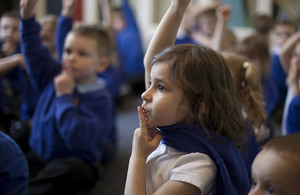Top academy heads elected to help schools flourish
1,600 academy heads took part in headteacher board elections

The Department for Education has announced the names of the 32 headteachers who have been voted by their peers to sit on the boards of the 8 new regional schools commissioners (RSCs).
More than 1,600 headteachers took part in the vote to elect their peers to the headteacher boards (HTBs), which start in September. These new bodies, of 6 to 8 members, will help the 8 newly appointed RSCs be champions for academy freedoms, identify where new academies can be created, and provide a failure regime for the small number of academies which are struggling.
The 32 elected are education experts with the experience and local knowledge needed to help academies in their areas flourish. They are all headteachers, or recent headteachers, from schools judged by Ofsted to have ‘outstanding’ leadership and management.
RSCs will take on responsibilities previously held by the Secretary of State, such as agreeing or rejecting academy applications, and their combined local insight will mean they can make informed decisions on when and how to intervene.
Schools Minister Lord Nash said:
Headteacher boards will provide an excellent body of support for our regional school commissioners in their task of improving the education of pupils across England.
These elections show heads recognise the value that HTBs can play in shaping the future of the education system.
The collective expertise and wisdom of HTBs will help keep schools to account, champion academy freedoms and ensure swift action is taken when things go wrong.
The number of academy schools has increased dramatically since May 2010, when there were just 203 academies, all sponsored and all secondary. Latest figures show there are now 4,199 academies overall, with 58% of secondary schools now academies and 12% of primaries now academies.
RSCs’ responsibilities will include:
- taking decisions on the creation of new academies on behalf of the Education Secretary
- monitoring academy performance and improving underperforming academies
- ensuring there is a strong supply of excellent sponsors to work with underperforming schools in the region
Two additional board members will be appointed by each RSC, and the board will be able to co-opt further members to fill skills or expertise gaps.
Schools Commissioner Frank Green said:
I am absolutely delighted that we have had so many headteachers taking part in the establishment of the headteacher boards. 159 candidates stood for election for the 32 elected posts on the 8 regional HTBs with a turnout of almost 40% in the elections.
The academy and free school leaders have demonstrated their appetite and commitment to leading our new, self-managing, self-improving education system, which augurs well for its success. And this means that many more children will have better outcomes as a result.
The headteachers elected to the HTBs are:
| RSC (region) | Elected headteachers (school) |
|---|---|
| Paul Smith (Lancashire and west Yorkshire) | Jane Acklam (Moor End Academy), Pamela Birch (Hambleton Primary School), Martin Shevill (Ossett Academy and Sixth-Form College), Alan Yellup (Wakefield City Academy) |
| Janet Renou (north of England) | Zoe Carr (Town End Academy), Chris Clarke (Queen Elizabeth School), Nick Hurn (Cardinal Hume Catholic School), Lesley Powell (The Academy at Shotton Hall) |
| Dominic Herrington (south London and south-east England) | Rhona Julia Barnfield (Howard of Effingham School), Ian Bauckham (Bennett Memorial Diocesan School), Andrew Carter (South Farnham School), Denise Shepherd (Rochester Grammar School) |
| Martin Post (north-west London and south central England) | Richard Edwards (Nicholas Hawksmoor Primary School), Sir Michael Griffiths (Northampton School for Boys), Claire Robins (Sir John Lawes School), Teresa Tunnadine (The Compton School) |
| Pank Patel (west Midlands) | Mike Donoghue (John Taylor High School), Billy Downie (The Streetly Academy), David Andrew Seddon (Baxter College), Sally Yates (Deanery Church of England Primary School) |
| Sir David Carter (south-west England) | Dave Baker (Bradley Stoke Community School and Abbeywood Community School), Lorraine Heath (Uffculme School), Lisa Mannall (Trenance Learning Academy), Roger Pope (Kingsbridge Community College) |
| Dr Tim Coulson (north-east London and east of England) | Caroline Mary Bronwyn Haynes (Tendring Technology College), Stephen Munday (Comberton Village College), Debbie Rogan (The Wickford Church of England School and Briscoe Primary), Margaret Wilson (The King John School Academy Trust) |
| Jenny Bexon-Smith (east Midlands and the Humber) | Chris Beckett (The Deepings School), Hugh Howe (Beauchamp College), Christine Linnitt (Holywell Primary School), Geoff Lloyd (Tuxford Academy) |
Notes to editors
- The electorate was made up of headteachers of all academies in England open on 1 May 2014. Each headteacher was only able to vote in the election for the HTB covering the region in which their academy is located.
- The elections used a first-past-the-post system with conditions to ensure that at least one primary head and one secondary head is represented and to ensure that no more than one head per single academy chain is elected onto each board.
- Candidates for the elected positions must either:
- currently be serving as a headteacher/executive head of an academy rated by Ofsted as ‘outstanding’ overall with ‘outstanding’ leadership and management
or
- currently be serving as a headteacher/executive head of an academy rated by Ofsted as ‘good’ overall with ‘outstanding’ leadership and management
or
- have recently (within 2 years of the closing date of the election) served as a headteacher/executive head of an academy which met either of the above rules
DfE media enquiries
Central newsdesk - for journalists 020 7783 8300